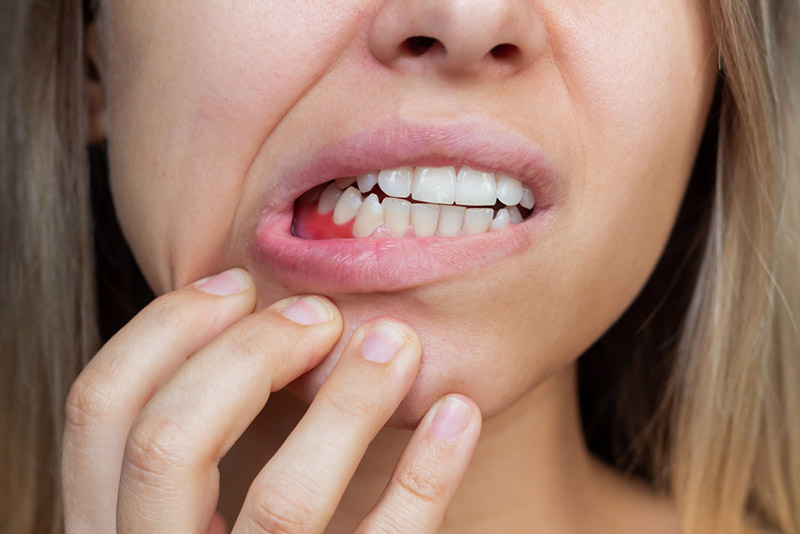
Whether you know you have gum disease or you think you do, there are steps you can take to resolve it. These steps start at home. Learning how to cure gum disease without a dentist can be just as important as the work that’s done in your dentist’s office.
Causes of Gum Disease
Gum disease typically begins as a result of insufficient oral hygiene. Plaque regularly forms on your teeth each day, but if you’re not brushing and flossing adequately, it can build up and cause the early stages of gum disease.
Without timely treatment, plaque can harden and become tartar, which can form under the gum line and requires a professional dental cleaning to remove. As such, excellent oral hygiene is your first and most important defense against gum disease.
Apart from insufficient oral care, causes and risk factors for gum disease can include:
- Certain medications
- Diseases like Crohn’s disease, diabetes, and rheumatoid arthritis
- Drug use
- Dry mouth
- Family history of gum disease
- Hormone changes
- Immunodeficiency
- Inadequate nutrition
- Lack of vitamin C
- Smoking and chewing tobacco
Symptoms of Gum Disease
Gum disease, also called periodontal disease, develops gradually without clear symptoms at first. That’s why regular dental visits are vital for catching issues early. There are two main stages of gum disease – gingivitis and periodontitis. As gingivitis progresses to periodontitis, symptoms become more noticeable.
Early Stages
In the early stage, called gingivitis, inflammation causes subtle changes like:
- Gums that appear more red or puffy than normal
- Gums that feel tender when touched or brushing
- Gums that bleed easily during brushing
- Bad breath that persists despite brushing
Because these signs are mild, many ignore them. But swollen, bleeding gums indicate bacteria is already harming gum tissue. Getting dental care at the first symptoms can treat gingivitis before further damage occurs.
Advanced Stages
Without treatment, gingivitis can become the more severe periodontitis. At this stage, bacteria start destroying the underlying bone anchoring teeth. As tissues and bone erode, signs escalate:
- Gums pull back from teeth looking longer
- Teeth feel loose or like they have moved
- Pus accumulates between teeth and gums
- Mouth tastes consistently unpleasant
- Permanent teeth shift position or loosen enough to fall out
By the time such clear changes happen, significant loss has already occurred in the tissues and bone meant to support teeth. It requires urgent specialized periodontal treatment at this point to save remaining teeth. That’s why paying attention to subtle gum changes can reveal issues.
If you experience any of these gum disease symptoms, be sure to contact your dentist right away!
Treating Gum Disease
Once a form of gum disease occurs, treating it may require several steps, depending upon the severity of your disease. Mild gum disease, called gingivitis, may be fixed with improved oral hygiene at home, while periodontitis typically needs improved home care and intervention from your dentist.
Advanced periodontitis typically results in bone loss and tissue damage, requiring more aggressive treatment. Here’s what to expect:
Mild gum disease issues
Gingivitis typically presents as inflammation and irritation in the gums, including bleeding when you floss and brush your teeth. Treatment for all types of gum disease typically starts here and includes:
- Improved brushing and flossing technique
- Better oral care products
- Consistent oral care habits
- Improving your diet and hydration
- Quitting tobacco use
Serious gum disease issues
At this point, you may have some bone and tissue loss, as well as pockets along your gum line. This can result in loose teeth and an altered bite. Additional treatment typically includes:
- A professional deep cleaning in the dentist’s office called “scaling and planning.” Scaling involves removing tartar above and below the gum line, including in pockets. Planing involves smoothing the surface of the tooth’s root so it’s harder for bacteria to attach to it.
Advanced gum disease
Eventually, gum disease can cause irreversible damage to the bones and tissue fibers supporting your teeth, causing your teeth to shift and loosen. Without timely and aggressive treatment, you may lose teeth. A “scaling and planing” deep cleaning will be necessary and additional treatment may include:
- Antibiotic or antimicrobial rinse or topical medication
- Bite adjustment to protect loose or shifting teeth
If your gum disease is so advanced that none of these interventions are successful, surgical intervention may be necessary. As such, you must begin treating gum disease as soon as you see the first signs.

Thankfully, even if you’re beyond learning how to cure gum disease without a dentist, you can begin treating the problem at home until you can get in to see your dentist. Understanding the structure of the bones that support your teeth and your overall health will help you better maintain your teeth and gums.
Incorporating Gum Disease Treatment at Home
If your gum disease is in the early stages, gingivitis can often be resolved by improving your oral hygiene habits. Even if you do need your dentist’s help to address your gum disease, starting gum disease treatment at home still helps. Treat your gum disease at home with an excellent oral care routine. Here’s what you should do:
- Brush twice per day for 2 minutes each time
- Use the right brushing technique to get under the gum line
- Use a toothbrush that’s in good shape, ensuring you replace it every 3 months
- Use a dentist-recommended toothpaste
If you’re already doing this, you may need to change other daily habits. For instance, drink plenty of water and avoid foods and beverages that harm your teeth and gums. In addition, if you use tobacco products, quit right away.
Some home remedies for gum disease can be helpful as well. If your gums are inflamed and irritated, swishing with salt water can help reduce the harmful bacteria that cause it. Drinking antioxidant-rich green tea may help calm inflammation.
However, don’t rely entirely on home remedies for gum disease. To treat it properly, see your dentist.
When to See Your Dentist About Gum Disease
Regular visits to your dentist every six months allow tracking of gum health and guidance on treatments for gum disease. More frequent visits every three to four months may be needed for moderate or advanced gum disease until it improves.
However, it’s wise to see your dentist promptly if unhealthy gums are suspected – early detection makes gum disease easier to treat. Wondering how to cure gum disease without a dentist? While professional dental care is highly recommended, developing good at-home care habits can help prevent gum disease in the first place.
This includes brushing properly twice a day, flossing daily, using antibacterial mouthwash, limiting sugary foods/drinks, quitting smoking if applicable, and tracking for early signs like red, swollen, or bleeding gums.
Establishing healthy habits allows getting ahead of gum issues before they escalate or require intensive treatments. Maintaining gum health remains easier with a dentist’s oversight, but prevention starts at home.
To learn more about how keeping your mouth healthy is a vital part of staying healthy overall, order your copy of If Your Mouth Could Talk.

